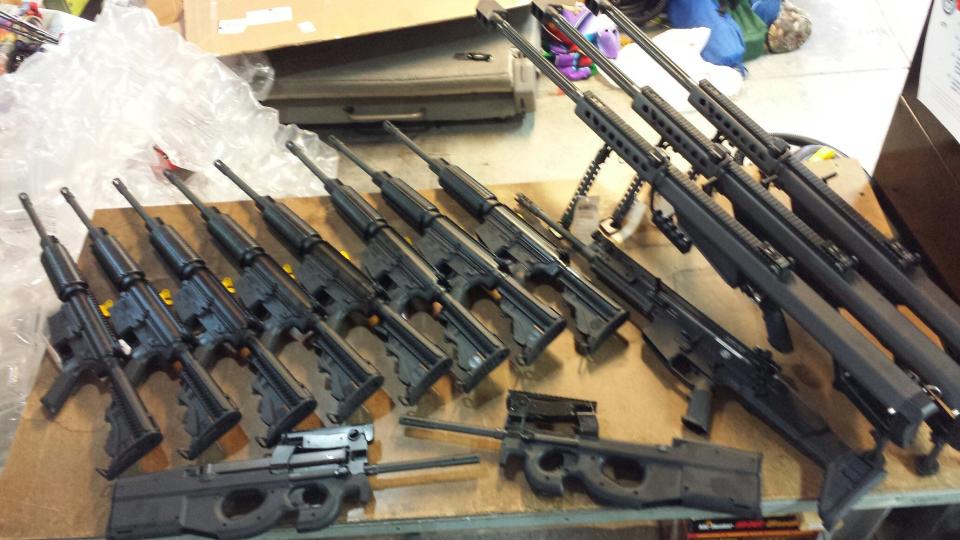Armed cartels: Why two Texas Democrats seek to ban the private sales of .50 caliber rifles
- Oops!Something went wrong.Please try again later.
- Oops!Something went wrong.Please try again later.
Three congressional Democrats, including two from Texas, introduced a bill Thursday calling for a ban on private sales of the civilian version of .50-caliber rifles, which the military uses to bring down targets such as light aircraft and tactical ground vehicles.
Unlike similar, and largely unsuccessful, efforts to curb the sale of other military-style rifles, the bill by U.S. Reps. Joaquin Castro of San Antonio, Veronica Escobar of El Paso and Maxwell Frost of Orlando, Fla., is not a reaction to the spate of deadly mass shootings across the country. Instead, it is aimed at combating the resale of the so-called sniper rifles to transnational criminal organizations, commonly called cartels, operating in Mexico and other Latin American countries.
“When I speak to leaders in Latin America and the Caribbean, their number-one request is for Congress to stop American weapons of war from falling into the hands of the gangs that are destabilizing their countries,” Castro said in a news release. “Especially in Mexico, access to .50-caliber rifles has fundamentally altered the balance of power between criminal organizations and the government and allowed cartels to become virtually untouchable."

Federal agencies over the past several years have arrested numerous people believed to be cartel members in possession of weapons, including .50-caliber rifles, that had been legally purchased in the United States and then resold across the border.
In late March, the Justice Department announced it arrested five people in South Texas who were charged with trafficking military grade firearms to a drug cartel in Mexico. Among the weapons seized were Barrett .50-caliber rifles; the entire cache was sold for $169,900, which the federal agency said was "a markup from the retail price of the guns so (one of the suspects) could derive a profit for himself."
The Louisville Courier Journal, part of the USA TODAY Network, reported in 2022 that a joint investigation by U.S. and Mexican officials determined that a .50-caliber rifle purchased in the United States and sold to cartels helped bring down a military helicopter that was part of a secretive 2015 raid to arrest a leader of the powerful Cártel Jalisco Nueva Generación, or CJNG.
"Congress can have meaningful debates about broader gun safety reform — but we should all be able to agree that U.S. gun manufacturers should not be selling the weapons that Mexican cartels use to down military helicopters and attack police convoys," Castro said.
More: 2024's new gun laws change the rules of firearm ownership in America. Here's how
According to the Gifford Law Center, a firearms safety advocacy group, California, Connecticut, Illinois, New Jersey and the District of Columbia have enacted bans on at least some models of .50-caliber rifles. Earlier this month, the National Rifle Association, a leading firearms rights advocacy organization, hailed as a "huge victory" a Colorado Senate committee's scuttling on May 7 of a proposal to ban certain weapons used in mass shootings, including .50-caliber rifles.
The NRA claimed on its website that "these rifles are essentially never used in crime."
The proposed federal bill, which its backers call the "Stop Arming Cartels Act of 2024," faces an uphill fight in the Republican-controlled U.S. House.
According to Castro's office, the measure seeks to:
Ban the manufacture, importation, sale, transfer or possession of .50-caliber rifles excluding governmental use of these arms.
Regulate .50-caliber rifles that are currently possessed lawfully under the National Firearms Act, by assigning a fee waiver and 12-month grace period to register the weapon on the National Firearms Registration and Transfer Record.
Establish an exception to the Protection of Lawful Commerce in Arms Act, enabling victims of gun violence to sue manufacturers and dealers who engage in firearm transactions that violate the Foreign Narcotics Kingpin Designation Act.
Escobar, whose congressional district shares a border with Mexico, said the legal availability of .50-caliber rifles and its consequences "don't just impact our communities, but they also impact our neighbors in Latin America and around the world."
"A refusal to act would mean continuing to arm transnational criminal organizations and cartels that purchase these weapons for illicit acts," she said in the news release.
This article originally appeared on Austin American-Statesman: Three US House members seek to ban 'sniper rifle' sales to civilians

